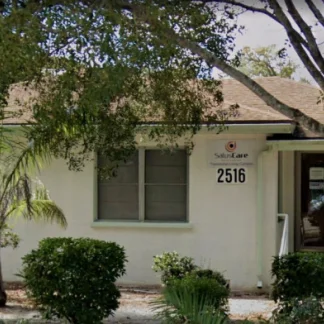Lutheran Family Services
Lutheran Family Services is a private rehab located in Fort Myers, Florida. Luth...
SalusCare - Grand Avenue offers transitional housing services for individuals with alcohol and/or substance addiction. The program includes individual counseling, group therapy, aftercare support and more. SalusCare - Grand Avenue is located at Fort Myers, Florida.
Contact us for more information: (239) 338-2977

Connect with SalusCare - Grand Avenue by calling their admissions team directly.
(239) 338-2977 Website Get DirectionsThe Commission on Accreditation of Rehabilitation Facilities (CARF) is a non-profit organization that specifically accredits rehab organizations. Founded in 1966, CARF's, mission is to help service providers like rehab facilities maintain high standards of care.
CARF Accreditation: Yes
Research clearly demonstrates that recovery is far more successful and sustainable when loved ones like family members participate in rehab and substance abuse treatment. Genetic factors may be at play when it comes to drug and alcohol addiction, as well as mental health issues. Family dynamics often play a critical role in addiction triggers, and if properly educated, family members can be a strong source of support when it comes to rehabilitation.
Group therapy is any therapeutic work that happens in a group (not one-on-one). There are a number of different group therapy modalities, including support groups, experiential therapy, psycho-education, and more. Group therapy involves treatment as well as processing interaction between group members.
In individual therapy, a patient meets one-on-one with a trained psychologist or counselor. Therapy is a pivotal part of effective substance abuse treatment, as it often covers root causes of addiction, including challenges faced by the patient in their social, family, and work/school life.
Group therapy is any therapeutic work that happens in a group (not one-on-one). There are a number of different group therapy modalities, including support groups, experiential therapy, psycho-education, and more. Group therapy involves treatment as well as processing interaction between group members.
In individual therapy, a patient meets one-on-one with a trained psychologist or counselor. Therapy is a pivotal part of effective substance abuse treatment, as it often covers root causes of addiction, including challenges faced by the patient in their social, family, and work/school life.
In individual therapy, a patient meets one-on-one with a trained psychologist or counselor. Therapy is a pivotal part of effective substance abuse treatment, as it often covers root causes of addiction, including challenges faced by the patient in their social, family, and work/school life.
Lutheran Family Services is a private rehab located in Fort Myers, Florida. Luth...
Children’s Advocacy Center is a private rehab located in Fort Myers, Florida. Ch...
Alan Gruning and Associates is a private rehab located in Fort Myers, Florida. A...
Family Preservation Services is a private rehab located in Fort Myers, Florida. ...